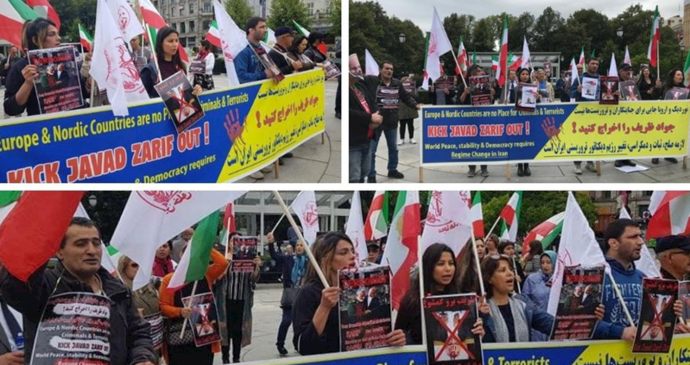Analysis by PMOI/MEK
Iran, August 25, 2019–While the Iranian regime’s Foreign Minister Mohammad Javad Zarif was on his European tour to resuscitate INSTEX, Iranian media and officials was advertising that the European countries’ invitation of Zarif is a sign of victory after being blacklisted by the U.S. State Department.
The Instrument in Support of Trade Exchanges (INSTEX) is a clearinghouse mechanism, co-sponsored and hosted by the European signatories of the 2015 Iran nuclear deal (known as the Joint Comprehensive Plan of Action – JCPOA) that is supposed to help the Iranian regime circumvent U.S. sanctions by exchanging its oil for non-sanctioned goods and services like food and medicine. But ironically, the ruling mullahs in Iran won’t receive a cent by trading through INSTEX while the goods and services that they can exchange for oil aren’t sanctioned in the first place. Adding insult to injury, Europe hasn’t yet made even this watered down mechanism operational and is setting conditions for it that has caused turmoil and internal disputes within the ranks of the Iranian regime.
Iranian officials conveniently forget the fact that Sweden’s foreign minister, in response to reporters bombarding her with questions, said that nobody invited Zarif and that he traveled to Sweden on his own initiative.
But that’s not all the humiliation for the thieving thugs heading the so-called Islamic Republic of Iran.
While Zarif was highlighting his visit with French President Emmanuel Macron to cover the fiasco of his visit to Nordic countries, other signs of sheer isolation were pouring in.
On August 21, Iranian state-run television reported the conclusion of United Nations Security Council’s meeting and position of European countries, including France, about the regime: “European countries, including France and Britain, without mentioning that they are not fulfilling their obligations under the JCPOA, claimed once again that they are committed to the JCPOA, and asked Iran to stop decreasing its JCPOA obligations and put an end to its defense powers.”
“Defense powers” in the Iranian regime’s terminology means ballistic missiles capabilities, which, in the hands of a theocracy with a grave record of terrorism, is outright dangerous.
Another program on state-run television said: “While the UN Security Council meeting was about international peace and security in the Middle East, Iran and the JCPOA were the main subjects of the session. U.S. Secretary of State [Mike Pompeo], whose country has violated UNSC Resolution 2231, criticized Iran for decreasing its obligations under the JCPOA. Pompeo accused Iran of supporting terrorism and said that groups affiliated with Iran are still continuing their work in Iraq, Syria, Lebanon and Yemen. The French representative to the Security Council also reiterated his European allies’ position about the JCPOA but said that Paris is concerned about Iran’s recent steps to decrease its obligations under the JCPOA.”
Zarif, facing an international backlash, implicitly threatened to resort to terrorism. “Mutual unpredictability leads to chaos. U.S. President Donald Trump can’t expect himself to be unpredictable and other stay predictable. Being unpredictable leads to mutual unpredictability and unpredictability leads to chaos.”
Also on August 21, Iranian regime Foreign Ministry spokesperson Abbas Mousavi said: “Until now, negotiations and discussions regarding Europe’s obligations in the JCPOA have not borne fruit… There is little time left of Iran’s ultimatum to Europe in the second step and we are waiting to see where these negotiations lead to. There have been some calls between Mr. Macron with Mr. Rouhani but there haven’t been any results yet. The third step is also being planned based on the other side’s measures.”
Over the past few months, Iran has gradually decreased its obligations under the JCPOA, doing it in steps, and making a show of threats and propaganda with little substance.
It seems like this time threats and terrorism are not working, leaving the ruling theocracy in Iran with little options but to bow or risk the possibility of military confrontation.





